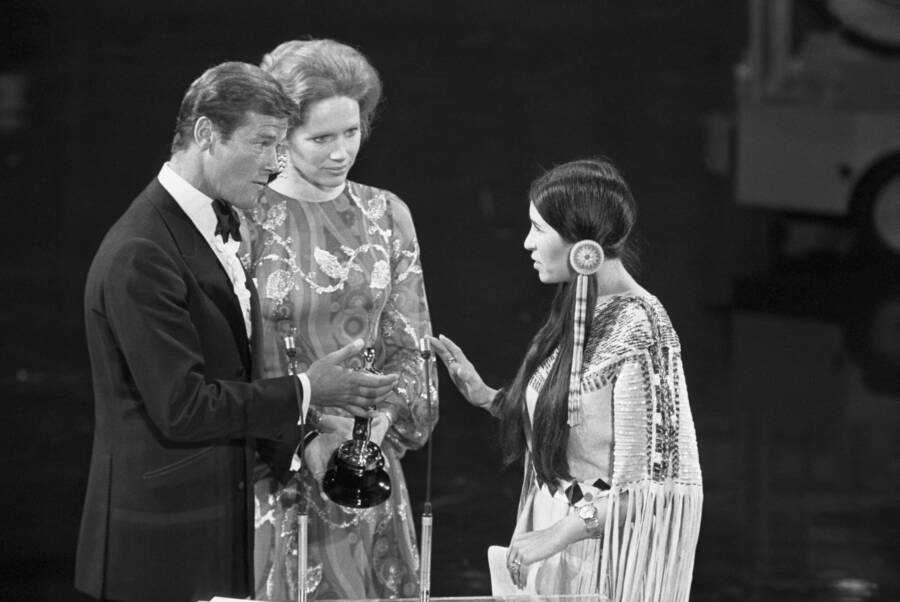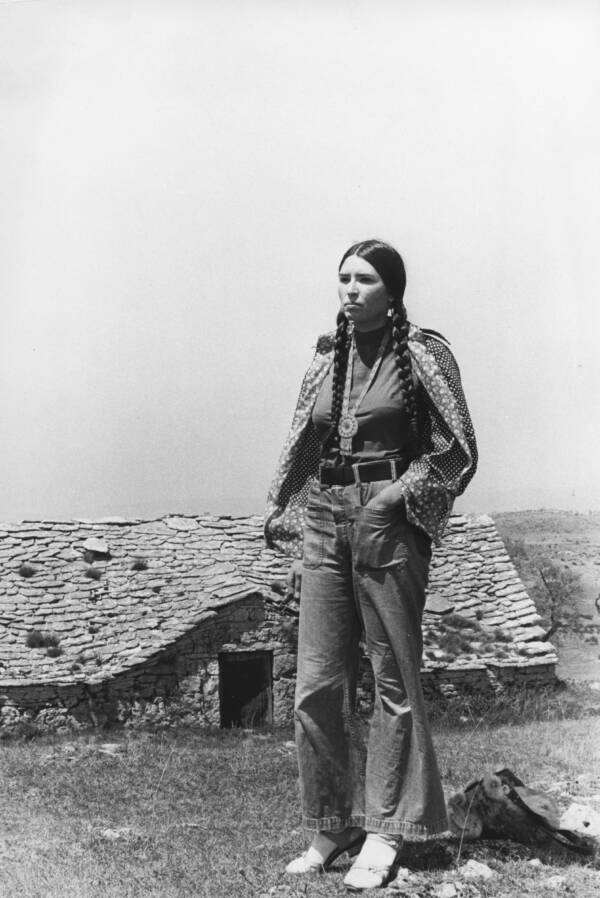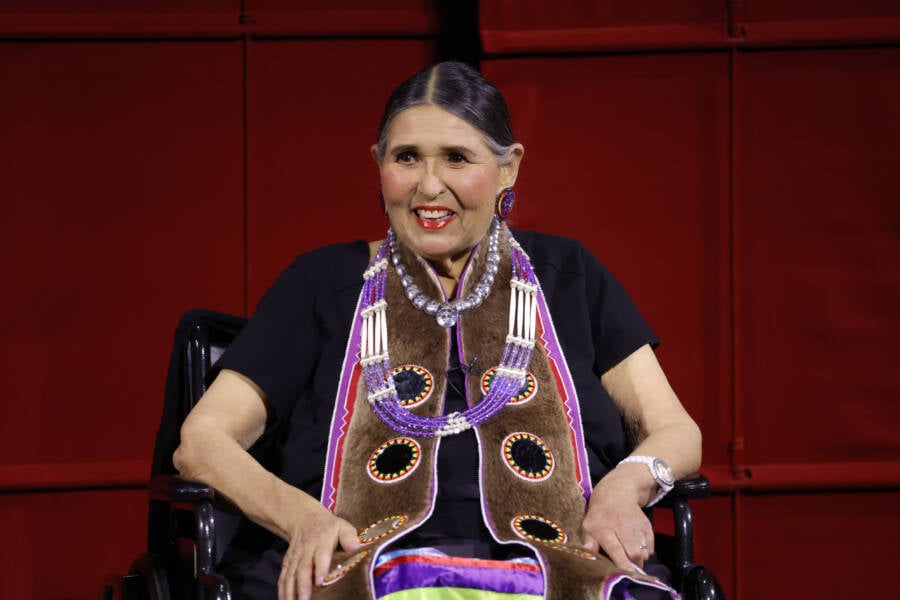Marie Cruz, who renamed herself Sacheen Littlefeather, made history at the Academy Awards in 1973 with an impassioned speech that was met with boos, but many believe she fabricated her Native American heritage.

Bettmann/Getty Images Sacheen Littlefeather declining Marlon Brando’s Oscar in 1973.
One of the most shocking moments in Academy Awards history came in 1973, when Marlon Brando won Best Actor for his role in The Godfather. Then, it wasn’t Brando who mounted the stage, but a 26-year-old Native American activist named Sacheen Littlefeather.
As the audience cheered and jeered, Littlefeather declined Brando’s Oscar. She delivered a brief statement critiquing the depictions of Native Americans in Hollywood, and the media blackout of a standoff between Native Americans and federal agents in Wounded Knee, South Dakota.
Her speech lasted less than 60 seconds. But it left an enduring impact. Though Littlefeather’s own career in Hollywood came to a premature end, activists credit her with bringing attention to the events at Wounded Knee, and many Native American filmmakers believe her speech profoundly changed how Native Americans were portrayed in Hollywood.
Still, speaking at the Oscars was just one of many brave things that Sacheen Littlefeather did during her life.
How Sacheen Littlefeather Became An Activist

Etienne MONTES/Gamma-Rapho via Getty ImagesSacheen Littlefeather became an activist in her 20s after a turbulent childhood.
Born Marie Louise Cruz on November 14, 1946, in Salinas, California, Sacheen Littlefeather grew up with a white mother and a White Mountain Apache and Yaqui father. She later told the Guardian that her parents were both mentally ill and abusive, and that she “became an activist” the first time she defended her mother from her father’s beatings.
Raised by her maternal grandparents, Littlefeather often struggled with feeling out of place. The Washington Post reports that she was bullied for her dark hair and skin, and Littlefeather told the Guardian that she was called “the N-word” at the white Catholic school that she attended.
“I was so confused about my own identity, and I was suffering,” Littlefeather told the Guardian, noting that she attempted suicide as a teenager and was hospitalized. “I could not tell the difference between me and my pain.”
Starting in her teens, however, Littlefeather began to get in touch with her Native American roots. She visited reservations, learned about indigenous traditions, and witnessed the occupation of Alcatraz by Native American activists in the late 1960s and early 1970s. According to the Washington Post, she joined the American Indian Movement in her 20s and changed her name to Sacheen Littlefeather as a nod to her heritage.
As an activist, Littlefeather was especially interested in the depictions of Native Americans in popular culture. She’d had her own experiences being typecast as she booked roles in radio and TV, and she and others helped lead the campaign to convince Stanford University to drop its racist “Indian” symbolism.
“In the ’70s, you had the [American Indian Movement] and the Indian Civil Rights Movement and that was the part that I was in,” she explained, according to the Hollywood Reporter. “I was a spokesperson, so to speak, for the stereotype of Native Americans in film and in television. All I was saying was, ‘We don’t want Chuck Connors playing Geronimo.'”
It was Littlefeather’s interest in Native Americans in Hollywood that led her to approach her neighbor, the director Francis Ford Coppola, who she’d met while hiking past his house. According to the Guardian, she had heard Marlon Brando speaking about Native American rights, and wanted to know if he was “for real.” After some convincing, Coppola agreed to put them in touch.
Brando and Littlefeather hit it off. And when the actor was nominated for an Academy Award for his role as Vito Corleone in Coppola’s 1972 film The Godfather, he came to Sacheen Littlefeather with an idea.
Making Oscars History
According to the Washington Post, Marlon Brando came to Sacheen Littlefeather on the day before the 1973 Academy Awards and suggested that she decline his Oscar if he won. As CNN reports, Brando wanted to protest the portrayal of Native Americans in Hollywood, and call attention to the standoff between federal agents and Native Americans in Wounded Knee.
On the day of the Oscars, March 27, 1973, Littlefeather waited nervously while Brando typed out an eight-page speech. According to the Guardian, she arrived at the ceremony just minutes before the Best Actor winner was announced and was met by its producer, Howard Koch, who told her she could not read Brando’s speech or speak for more than 60 seconds.
“And then it all happened so fast when it was announced that he had won,” Littlefeather said, according to the Guardian. “I had promised Marlon that I would not touch that statue if he won. And I had promised Koch that I would not go over 60 seconds. So there were two promises I had to keep.”
Wearing a buckskin dress and moccasins, her dark hair framing her face, Littlefeather mounted the stage and declined to take Brando’s Oscar from presenter Roger Moore. She called out Hollywood for its often offensive and stereotypical depictions of Native Americans and urged the audience to pay more attention to the occupation of Wounded Knee.
“I beg at this time that I have not intruded upon this evening and that we will in the future, our hearts and our understandings will meet with love and generosity,” Littlefeather said, according to the Los Angeles Times.
She later recalled that the audience made racist tomahawk gestures as she finished, and that actor John Wayne tried to storm the stage from the wings (though some film scholars dispute this).
Sacheen Littlefinger’s Oscar speech lasted less than 60 seconds. But it would profoundly impact her life, and Hollywood itself.
In the aftermath of her appearance at the Oscars, Sacheen Littlefeather saw her fledgling acting career dry up. She’d been blacklisted by Hollywood studios — or, as Littlefeather called it, “redlisted.” Stories spread that she was a stripper and not really Native American, and Brando later expressed regret for putting her in a vulnerable position.
“I was distressed that people should have booed and whistled and stomped, even though perhaps it was directed at myself,” he said on the Dick Cavett Show months later, according to the Los Angeles Times. “They should have at least had the courtesy to listen to her.”
The Debate About Her Native American Heritage

Frazer Harrison/Getty ImagesSacheen Littlefeather in September 2022, shortly before her death from breast cancer.
Though Littlefeather largely dropped out of the public eye following her Oscar appearance, she continued her career in activism. She dedicated herself to fighting Native American unemployment, alcoholism, and AIDS for decades to come.
Yet the debate about Littlefeather’s claims to Native American heritage have persisted. In 2022, investigative journalist Jacqueline Keeler, of the Navajo and Yankton Dakota Sioux tribes, published a 200-person list of “Pretendians,” public persons faking Native ancestry for personal gain. Sacheen Littlefeather was on that list.
“My review of her father’s side of the family tree, where she claimed her Native heritage, found no documented ties between his extended family and any extant Native American nations in the United States,” Keeler wrote for the San Francisco Chronicle in 2022.
Littlefeather’s own sisters, Trudy Orlandi and Rosalind Cruz, told Keeler that their family “never claimed this heritage growing up.” They added that Littlefeather’s story of an impoverished upbringing was also fabricated. They concluded that Littlefeather had adopted her father’s own childhood story and made it her own.
“My father was deaf and he had lost his hearing at nine years old through meningitis,” Cruz said. “He was born into poverty. His father, George Cruz, was an alcoholic who was violent and used to beat him. And he was passed to foster homes and family. But my sister Sacheen took what happened to him.”
But Keeler’s research has been questioned by other Native journalists. She has reportedly named at least four people who were, in fact, able to prove their authentic Native heritage.
Additionally, journalist Laura Clark, of the Muscogee and Cherokee tribes, also questioned Keeler’s process. She added that documentation to prove tribal status is not always easy to come by, in large part due to the systematic erasure of Native peoples.
“What many people don’t understand about Native existence is that some Natives aren’t enrolled,” Clark wrote for Variety. “Some Natives are reconnecting with their tribes. Some Natives don’t have enough ‘Indian blood’ to register… And some Natives have had their tribes nearly erased to the point that organized citizenship records simply don’t exist.”
She added that citizenship requirements vary from tribe to tribe. Littlefeather’s purported tribes have not publicly spoken on the matter to the knowledge of this publication.
Where Is Sacheen Littlefeather Today?
Nonetheless, in 2022, almost 50 years after she declined Brando’s Oscar, the Academy formally apologized to Sacheen Littlefeather for the audience’s reaction to her speech and for the years of mistreatment that followed.
“The emotional burden you have lived through and the cost to your own career in our industry are irreparable,” former Academy President David Rubin wrote Littlefeather, according to CNN. “For too long the courage you showed has been unacknowledged. For this, we offer both our deepest apologies and our sincere admiration.”
Sacheen Littlefeather accepted the apology, joking that Native Americans were “patient” and that they use humor as a way to survive. Shortly before she died on Oct. 2, 2022, from breast cancer, Littlefeather told A.frame that she’d mounted the Oscar stage in 1973 with a simple but sincere request.
“All we were asking, and I was asking, was, ‘Let us be employed. Let us be ourselves. Let us play ourselves in films. Let us be a part of your industry, producing, directing, writing,'” she said. “‘Don’t write our stories for us. Let us write our own stories. Let us be who we are.'”
After reading about the death of Sacheen Littlefeather, discover the story of Iron Eyes Cody, the famous Native American actor who wasn’t Native American. Or look through these stunning portraits of Native Americans in the early 20th century.





